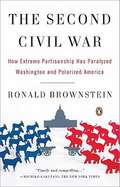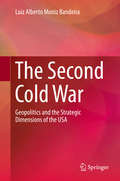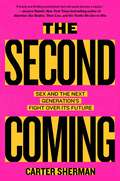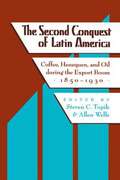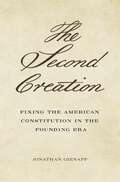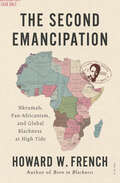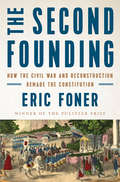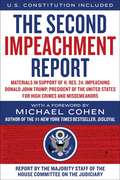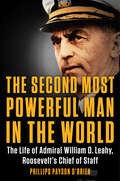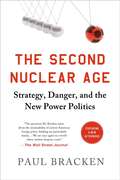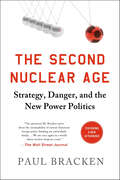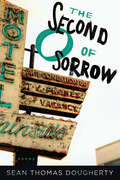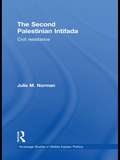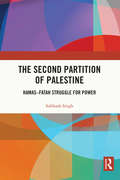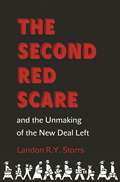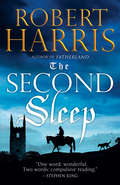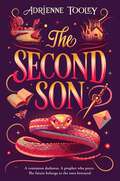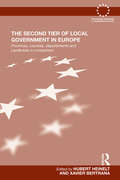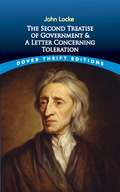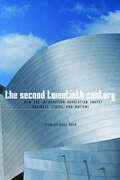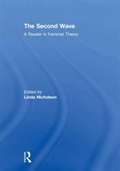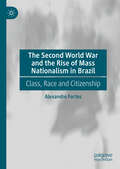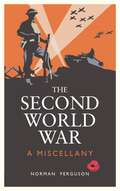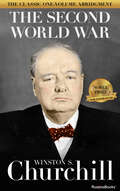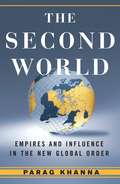- Table View
- List View
The Second Civil War
by Ronald BrownsteinIn recent years American politics has seemingly become much more partisan, more zero-sum, more vicious, and less able to confront the real problems our nation faces. What has happened? In The Second Civil War, respected political commentator Ronald Brownstein diagnoses the electoral, demographic, and institutional forces that have wreaked such change over the American political landscape, pulling politics into the margins and leaving precious little common ground for compromise. The Second Civil War is not a book for Democrats or Republicans but for all Americans who are disturbed by our current political dysfunction and hungry for ways to understand it--and move beyond it.
The Second Cold War
by Luiz Alberto Moniz BandeiraThis book investigates the geopolitics and strategic dimensions of US-American foreign policy during George W. Bush's and Barack Obama's presidential terms. Based on a vast amount of empirical and historical sources, the author offers deep insights into the recent political developments ('Arabellions') along the axis of Northern Africa, the Middle East, and Central Asia, situating them in the context of the global geopolitical and geo-economical Great Game, either latent or overt, between USA/NATO and Russia. The author also analyses the influence of the US on these historical and political processes in the last two decades.
The Second Coming: Sex and the Next Generation's Fight Over Its Future
by Carter ShermanEqual parts investigative reporting and cultural criticism, this is a look at the sex lives of young adults in post-Roe v. Wade, post-#MeToo America—and how the challenges they face are harbingers of what&’s coming for the rest of us.As a college student, award-winning journalist Carter Sherman, along with several members of her sorority, was interviewed by a writer looking for salacious details about their sex lives. But the sex the girls were having—or the lack thereof—seemed disappointing, and their stories didn&’t make the book&’s final cut. A decade later, young Americans are having less sex than past generations, and the sex they are having is infinitely more complicated. Sherman, who has spent years traveling the country reporting on gender and sexuality, wanted to find out why. Based on more than one hundred interviews with teenagers and young adults, activists, and experts, The Second Coming reveals how (mis)education, the internet, and politics have not only reshaped relationships but also unleashed a nationwide power struggle over the future of sex. From abortion clinics crowded with young patients, to &“Dating with Dignity&” seminars at the National Pro-Life Summit, to school board battles over what students should read, think, and feel, we meet folks from both sides of the aisle who are well-informed, empowered, and active (even if not always sexually). And as measures are taken to limit Americans&’ access to rights and resources, they are fighting back. In the tradition of Rebecca Traister and Lisa Taddeo, The Second Coming explores how the ballot box has infiltrated the bedroom, and the breaking point as a nation we&’ve reached as a result.
The Second Conquest of Latin America
by Allen Wells Steven C. TopikBetween 1850 and 1930, Latin America's integration into the world economy through the export of raw materials transformed the region. This encounter was nearly as dramatic as the conquistadors' epic confrontation with Native American civilizations centuries before. An emphasis on foreign markets and capital replaced protectionism and self-sufficiency as the hemisphere's guiding principles. In many ways, the means employed during this period to tie Latin America more closely to western Europe and North America resemble strategies currently in vogue. Much can be learned from analyzing the first time that Latin Americans embraced export-led growth.This book focuses on the impact of three key export commodities: coffee, henequen, and petroleum. The authors concentrate on these rather than on national economies because they illustrate more concretely the interaction between the environment, natural and human resources, and the world economy. By analyzing how different products spun complex webs of relationships with their respective markets, the essays in this book illuminate the tensions and contradictions found in the often conflictive relationship between the local and the global, between agency and the not-so-invisible hand. Ultimately, the contributors argue that the results of the "second conquest" were not one-sided as Latin Americans and foreigners together forged a new economic order--one riddled with contradictions that Latin America is still attempting to resolve today.
The Second Creation: Fixing the American Constitution in the Founding Era
by Jonathan GienappAmericans widely believe that the U.S. Constitution was almost wholly created when it was drafted in 1787 and ratified in 1788. Jonathan Gienapp recovers the unknown story of the Constitution’s second creation in the decade after its adoption—a story with explosive implications for current debates over constitutional originalism and interpretation.
The Second Emancipation: Nkrumah, Pan-Africanism, and Global Blackness at High Tide
by Howard W. FrenchNamed one of the Most Anticipated Books of 2025 by Foreign Policy "Howard French’s The Second Emancipation stands the second half of the last century on its geopolitical head." —David Levering Lewis, winner of the Pulitzer Prize From the acclaimed author of Born in Blackness comes an extraordinary account of Africa’s liberation from colonial oppression, a work that fundamentally reshapes our understanding of modern history. A work of epic dimension that recasts the liberation of twentieth-century Africa through the lens of revolutionary leader Kwame Nkrumah. The Second Emancipation, the second work in a trilogy from best-selling author Howard W. French about Africa’s pivotal role in shaping world history, underscores Adam Hochschild’s contention that French is a "modern-day Copernicus." The title—referring to a brief period beginning in 1957 when dozens of African colonies gained their freedom—positions this liberation at the center of a "movement of global Blackness," with one charismatic leader, Kwame Nkrumah (1909–1972), at its head. That so few people today know about Nkrumah is an omission that French demonstrates is "typical of our deliberate neglect of Africa’s enormous role in the birth of the modern world." Determined to re-create Nkrumah’s life as "an epic twentieth-century story," The Second Emancipation begins with his impoverished, unheralded birth in the far-western region of Ghana’s Gold Coast. But blessed with a deep curiosity, a young Nkrumah pursued an overseas education in the United States. Nowhere is French’s consummate style more vivid than in Nkrumah’s early years in Depression-era America, especially in his mesmerizing portrait of a culturally effervescent Harlem that Nkrumah encountered in 1935 before heading to college. During his student years in Pennsylvania and later as an activist in London, Nkrumah became steeped in a renowned international Black intellectual milieu—including Du Bois, Garvey, Fanon, Padmore, and C.L.R. James, who called him "one of the greatest political leaders of our century"—and formed an ideology that readied him for an extraordinarily swift and peaceful rise to power upon his return to Ghana in 1947. Four years later, in a political landslide he engineered while imprisoned, Nkrumah stunned Britain by winning the first general election under universal franchise in Africa, becoming Ghana’s first independent prime minister in 1957. As leader of a sovereign nation, Nkrumah wielded his influence to promote the liberation of the entire continent, pushing unity as the only pathway to recover from the damages of enslavement and subjugation. By the time national military and police forces, aided by the CIA, overthrew him in 1966, Nkrumah’s radical belief in pan-African liberation had both galvanized dozens of nascent African states and fired a global agenda of Black power. In its dramatic recasting of the American civil rights story and in its tragic depiction of a continent that once exuded all the promise of a newly won freedom, The Second Emancipation becomes a generational work that positions Africa at the forefront of modern-day history.
The Second Founding: How The Civil War And Reconstruction Remade The Constitution
by Eric FonerFrom the Pulitzer Prize–winning scholar, a timely history of the constitutional changes that built equality into the nation’s foundation and how those guarantees have been shaken over time. The Declaration of Independence announced equality as an American ideal, but it took the Civil War and the subsequent adoption of three constitutional amendments to establish that ideal as American law. The Reconstruction amendments abolished slavery, guaranteed all persons due process and equal protection of the law, and equipped black men with the right to vote. They established the principle of birthright citizenship and guaranteed the privileges and immunities of all citizens. The federal government, not the states, was charged with enforcement, reversing the priority of the original Constitution and the Bill of Rights. In grafting the principle of equality onto the Constitution, these revolutionary changes marked the second founding of the United States. Eric Foner’s compact, insightful history traces the arc of these pivotal amendments from their dramatic origins in pre–Civil War mass meetings of African-American “colored citizens” and in Republican party politics to their virtual nullification in the late nineteenth century. A series of momentous decisions by the Supreme Court narrowed the rights guaranteed in the amendments, while the states actively undermined them. The Jim Crow system was the result. Again today there are serious political challenges to birthright citizenship, voting rights, due process, and equal protection of the law. Like all great works of history, this one informs our understanding of the present as well as the past: knowledge and vigilance are always necessary to secure our basic rights.
The Second Impeachment Report: Materials in Support of H. Res. 24, Impeaching Donald John Trump, President of the United States, for High Crimes and Misdemeanors
by Majority Staff Committee on the JudiciaryWith a foreword by New York Times bestselling author and former confidante of Donald J. Trump, Michael Cohen, the official report of materials supporting the first-ever second impeachment of a President of the United States—complete with US Constitution included. In 2019, Donald Trump became only the third US President to be impeached by the House of Representatives on charges of abuse of power and obstruction of congress. In January 2021, he became the first President in American history to be impeached for a second time. Though no sitting president was ever convicted, will Trump be the first there, too? Still in the midst of the coronavirus pandemic, which the president has also been accused of handling poorly, and an ongoing refusal to concede his loss to rival candidate Joe Biden, Donald Trump is said to have provoked his followers to storm the US Capitol in Washington, DC, resulting in a shocking protest-turned-violent in an effort to stop the official Electoral count in certifying Biden's victory. The unprecedented event led to the deaths of at least five people, as well as the President being banned from all major social media, including Twitter, Facebook, Instagram, and more, due to risk of inciting more violence. This groundbreaking report—released by the House Judiciary Committee, chaired by Jerrold Nadler—covers Trump's conduct leading up to January 6, 2021, the attack on the capitol, his response to the insurrection, and provides a compelling argument as to why there is an immediate need to consider impeachment despite Trump having only seven days left in office.
The Second Most Powerful Man in the World: The Life of Admiral William D. Leahy, Roosevelt's Chief of Staff
by Phillips Payson O'BrienThe life of Franklin Roosevelt's most trusted and powerful advisor, Admiral William D. Leahy, Chief of Staff to the Commander-in-Chief“Beautifully written... In so many ways, Leahy was FDR’s indispensable strategist. In these pages are magnificent stories about Pearl Harbor, Vichy France, and Winston Churchill.”—Douglas Brinkley, New York Times bestselling author of American MoonshotAside from FDR, no American did more to shape World War II than Admiral William D. Leahy--not Douglas MacArthur, not Dwight Eisenhower, and not even the legendary George Marshall. No man, including Harry Hopkins, was closer to Roosevelt, nor had earned his blind faith, like Leahy. Through the course of the war, constantly at the president's side and advising him on daily decisions, Leahy became the second most powerful man in the world.In a time of titanic personalities, Leahy regularly downplayed his influence, preferring the substance of power to the style. A stern-faced, salty sailor, his U.S. Navy career had begun as a cadet aboard a sailing ship. Four decades later, Admiral Leahy was a trusted friend and advisor to the president and his ambassador to Vichy France until the attack on Pearl Harbor. Needing one person who could help him grapple with the enormous strategic consequences of the war both at home and abroad, Roosevelt made Leahy the first presidential chief of staff--though Leahy's role embodied far more power than the position of today. Leahy's profound power was recognized by figures like Stalin and Churchill, yet historians have largely overlooked his role. In this important biography, historian Phillips Payson O'Brien illuminates the admiral's influence on the most crucial and transformative decisions of WWII and the early Cold War. From the invasions of North Africa, Sicily, and France, to the allocation of resources to fight Japan, O'Brien contends that America's war largely unfolded according to Leahy's vision. Among the author's surprising revelations is that while FDR's health failed, Leahy became almost a de facto president, making decisions while FDR was too ill to work, and that much of his influence carried over to Truman's White House.
The Second Nuclear Age: Strategy, Danger, And The New Power Politics
by Paul BrackenA leading international security strategist offers a compelling new way to "think about the unthinkable." The cold war ended more than two decades ago, and with its end came a reduction in the threat of nuclear weapons―a luxury that we can no longer indulge. It's not just the threat of Iran getting the bomb or North Korea doing something rash; the whole complexion of global power politics is changing because of the reemergence of nuclear weapons as a vital element of statecraft and power politics. In short, we have entered the second nuclear age. In this provocative and agenda-setting book, Paul Bracken of Yale University argues that we need to pay renewed attention to nuclear weapons and how their presence will transform the way crises develop and escalate. He draws on his years of experience analyzing defense strategy to make the case that the United States needs to start thinking seriously about these issues once again, especially as new countries acquire nuclear capabilities. He walks us through war-game scenarios that are all too realistic, to show how nuclear weapons are changing the calculus of power politics, and he offers an incisive tour of the Middle East, South Asia, and East Asia to underscore how the United States must not allow itself to be unprepared for managing such crises. Frank in its tone and farsighted in its analysis, The Second Nuclear Age is the essential guide to the new rules of international politics.
The Second Nuclear Age: Strategy, Danger, and the New Power Politics
by Paul BrackenA leading international security strategist offers a compelling new way to "think about the unthinkable."The cold war ended more than two decades ago, and with its end came a reduction in the threat of nuclear weapons—a luxury that we can no longer indulge. It's not just the threat of Iran getting the bomb or North Korea doing something rash; the whole complexion of global power politics is changing because of the reemergence of nuclear weapons as a vital element of statecraft and power politics. In short, we have entered the second nuclear age.In this provocative and agenda-setting book, Paul Bracken of Yale University argues that we need to pay renewed attention to nuclear weapons and how their presence will transform the way crises develop and escalate. He draws on his years of experience analyzing defense strategy to make the case that the United States needs to start thinking seriously about these issues once again, especially as new countries acquire nuclear capabilities. He walks us through war-game scenarios that are all too realistic, to show how nuclear weapons are changing the calculus of power politics, and he offers an incisive tour of the Middle East, South Asia, and East Asia to underscore how the United States must not allow itself to be unprepared for managing such crises.Frank in its tone and farsighted in its analysis, The Second Nuclear Age is the essential guide to the new rules of international politics.
The Second O of Sorrow (American Poets Continuum Series #165)
by Sean Thomas DoughertySean Thomas Dougherty celebrates the struggles, the dignity, and the joys of working-class life in the Rust Belt. Finding delight in everyday moments—a night at a packed karaoke bar, a father and daughter planting a garden, a biography of LeBron James as a metaphor for Ohio—these poems take pride in the people who survive despite all odds, who keep going without any concern for glory, fighting with wit and grace for justice, for joy, every god damned day.
The Second Palestinian Intifada: Civil Resistance (Routledge Studies in Middle Eastern Politics)
by Julie M. NormanPalestinian civilians engaged in numerous acts of unarmed resistance during the second intifada. However, these attempts in using non-violent strategies were frequently overshadowed by the armed tactics of militant groups. Drawing from extensive interviews, surveys, and observations in the West Bank, this book provides an in-depth study of the often-overlooked aspects of popular resistance in Palestine. The book demonstrates how such unarmed tactics have considerable support amongst the local population particularly when they are framed as a strategy rather than just as a moral preference. However, whilst recognizing the successes of many civil-based initiatives, the author examines why a unified popular movement never fully emerged. She argues that obstacles extended beyond occupation policies to include political constraints from the Palestinian Authority, and agenda-setting efforts from sectors of the international community. Nevertheless, many activists continue to work creatively through diverse channels and networks to broaden the space for civil resistance. Combining critical analysis with activist narratives and community case studies, the book provides a comprehensive and compelling look at non-violent activism in the second intifada, offering a fresh perspective on the Israeli-Palestinian conflict, and illustrating both the challenges and opportunities in mobilizing for popular struggle.
The Second Partition of Palestine: Hamas–Fatah Struggle for Power
by Subhash SinghThis book examines the factors and issues responsible for the intra-Palestinian conflict that has undermined the strength and vitality of the struggle for liberation against the state of Israel. It explores how the ideological incompatibility and competition for political primacy account for the Hamas–Fatah conflict, entailing the risk of partition of Palestine even before it takes shape as an independent, sovereign entity. It analyzes the developments since the signing of the September 1993 Oslo Accord and discusses themes such as the background of Palestinian politics; the role of Fatah; the rise of Hamas as Fatah’s political rival; the Hamas–Fatah struggle for power; and the role played by the international community, including by the US and the European Union. The study deals with the various facets of territorial and political challenges faced by the rival Palestinian actions; the failure of the reconciliation efforts by Egypt and Yemen; the stalled peace process in the West Bank and Gaza Strip; the emergence of the Islamic resistance movement and secular nationalist party; and the political and ideological shifts in Palestinian politics. Comprehensive and topical, this book will be useful to scholars and researchers of West Asian studies, peace and conflict studies, politics and international relations, foreign policy, political studies, area studies and strategic and defence studies.
The Second Red Scare and the Unmaking of the New Deal Left (Politics and Society in Modern America #88)
by Landon R.Y. StorrsHow Red Scare politics undermined the reform potential of the New DealIn the name of protecting Americans from Soviet espionage, the post-1945 Red Scare curtailed the reform agenda of the New Deal. The crisis of the Great Depression had brought into government a group of policy experts who argued that saving democracy required attacking economic and social inequalities. The influence of these men and women within the Franklin D. Roosevelt administration, and their alliances with progressive social movements, elicited a powerful reaction from conservatives, who accused them of being subversives. Landon Storrs draws on newly declassified records of the federal employee loyalty program—created in response to claims that Communists were infiltrating the U.S. government—to reveal how disloyalty charges were used to silence these New Dealers and discredit their policies.Because loyalty investigators rarely distinguished between Communists and other leftists, many noncommunist leftists were forced to leave government or deny their political views. Storrs finds that loyalty defendants were more numerous at higher ranks of the civil service than previously thought, and that many were women, or men with accomplished leftist wives. Uncovering a forceful left-feminist presence in the New Deal, she also shows how opponents on the Right exploited popular hostility to powerful women and their supposedly effeminate spouses. The loyalty program not only destroyed many promising careers, it prohibited discussion of social democratic policy ideas in government circles, narrowing the scope of political discourse to this day.Through a gripping narrative based on remarkable new sources, Storrs demonstrates how the Second Red Scare repressed political debate and constrained U.S. policymaking in fields such as public assistance, national health insurance, labor and consumer protection, civil rights, and international aid.
The Second Sleep: A novel
by Robert HarrisFrom the internationally best-selling author of Fatherland and the Cicero Trilogy--a chilling and dark new thriller unlike anything Robert Harris has done before. <P><P>1468. A young priest, Christopher Fairfax, arrives in a remote Exmoor village to conduct the funeral of his predecessor. The land around is strewn with ancient artefacts--coins, fragments of glass, human bones--which the old parson used to collect. Did his obsession with the past lead to his death? <P><P> Fairfax becomes determined to discover the truth. Over the course of the next six days, everything he believes--about himself, his faith, and the history of his world--will be tested to destruction.
The Second Son (Betrayal Prophecies #2)
by Adrienne TooleyAn epic clash of deities explores the two facets of pain—rage versus sadness—in this rousing followup to The Third Daughter, a dark crown fantasy duology with a sweeping sapphic romance. The centuries-old prophecy has been fulfilled at last: the New Maiden has returned to Velle. Unfortunately, so has a malicious demi-god, whose elusive prophet is intent on converting the New Maiden&’s followers. The Second Son is a vengeful, angry deity, whose psalm resonates with the disenfranchised. With Elodie on the throne and Sabine in her own unique position of power, it should be easy enough to track down the culprit. Yet even as they're falling in love, both girls are keeping dangerous secrets from each other. While the cult of the Second Son threatens to overthrow not only the Church of the New Maiden but also Velle&’s monarchy, Elodie and Sabine must navigate impossible odds to dismantle the root of his power, all while their lives hang in the balance. The Second Son is a must-read for fans of: BookTok Romantasy Red Queen by Victoria Aveyard These Violent Delights by Chloe Gong Friends to Enemies / Betrayal Slow Burn Romance / One Bed
The Second Tier of Local Government in Europe: Provinces, Counties, Départements and Landkreise in Comparison (Routledge Advances in European Politics)
by Hubert Heinelt Xavier BertranaThis book takes a comparative approach to local government across 14 European countries, looking at processes of decentralisation, regionalisation and reforms of local government. Examining second levels of government, such as UK Counties, French Départements, Italian and Spanish Provinces, and German Landkreise, this book reveals both the specific characteristics of particular countries, and also similarities across Europe. As the first book focussing on the second level of local governments, this monograph combines comparative analysis of institutional trends and reforms of local government with examination of country-specific features to provide an original and insightful evaluation of European governance. Organised along common thematic lines, leading experts in their field outline the historical development of local government, and analyse recent or current reform debates. The book argues democratic quality and effectiveness of this territorial level of government is in the focus of on-going debates about the rescaling of statehood and a shift from ‘government to governance’. The Second Tier of Local Government in Europe will be of interest to students and scholars studying local government, public administration and multi-level governance.
The Second Treatise of Government and A Letter Concerning Toleration (Dover Thrift Editions Ser.)
by John LockeIn The Second Treatise of Government, John Locke answered two objectives: to refute the concept of the monarchy's divine right and to establish a theory reconciling civil liberties with political order. His Letter Concerning Toleration rests on the same basic principles as his political theory; Locke's main argument for toleration is a corollary of his theory of the nature of civil society. The basis of social and political philosophy for generations, these works laid the foundation of the modern democratic state in England and abroad. Their enduring importance makes them essential reading for students of philosophy, history, and political science.
The Second Twentieth Century: How the Information Revolution Shapes Business, States, and Nations
by Jean-Jacques RosaJean-Jacques Rosa offers an analysis of the "grand cycle" in social organization of the twentieth century, showing how the transformation in communication and information technology has led to the downfall of the old political and corporate hierarchies. He explains how today's explosion of freely available information is fueling the democratic free-market revolution and reveals its universal contemporary consequences.
The Second Wave: A Reader In Feminist Theory
by Linda NicholsonThe Second Wave collects many of the major essays of feminist theory of the past forty years, essays by the figures who have made key contributions to feminist theory during this period and have generated extensive discussion. Organized historically, these essays provide a sense of the major turning points in feminist theory.
The Second World War and the Rise of Mass Nationalism in Brazil: Class, Race and Citizenship
by Alexandre FortesThis book reexamines the socioeconomic and political transformation that occurred in Brazil during the 1940s as a result of the Second World War. Integrating social and political history, the author explores the adoption of new policies around state-sponsored industrialisation, the consolidation of Brazilian labour law institutions, and the expanded influence of ‘racial democracy’ in the country's domestic and foreign policy. The book argues that the nature of the Brazilian state and its definitions of citizenship were redefined both from ‘the top’ – as a result of Brazil’s integration in the new international order following the War – and ‘from below’ - as antifascism and mass nationalism opened new spaces for subaltern agency. Challenging traditional narratives on Brazil’s transition from the Estado Novo dictatorship of Getúlio Vargas to a postwar democratic experience, this book highlights the extent to which political developments were shaped by key global processes and foreign relations with the USA. The book also focuses on the ‘bottom-up’ forces and actors that brought about change in Brazil, emphasising the role of workers, protestors, and popular actors in shaping history. Breaking new ground in Brazilian historiography, this book makes a significant contribution to studies of populism and democratisation in Latin America.
The Second World War: A Miscellany
by Norman FergusonTelling the stories of the Battle of Britain, the Siege of Leningrad, the horrors of the Holocaust, the D-Day landings and the other battles, campaigns, aircraft, weapons, soldiers and heroes on the Home Front and abroad, this is a compelling guide to one of the most destructive and all-encompassing wars the world has ever seen.
The Second World War: The Classic One-Volume Abridgment (Winston S. Churchill The Second World War)
by Winston S. ChurchillThe former Prime Minister and Nobel Prize–winning author chronicles Britain’s World War II experience from the aftermath of WWI to July 1945.World War II was the most pivotal event of the twentieth century. It was Great Britain’s darkest and finest hour in which the nation’s people showed great resilience and resourcefulness. Helping to lead them through this tumultuous era was Sir Winston Churchill. The Second World War is his account of the period, compiled using his own notes as well as official documents to which he had official access.This edition of The Second World War is the classic one-volume abridgment of Sir Winston Churchill’s landmark history of the conflict. It was abridged by Denis Kelly (with Churchill’s approval) of the following volumes composed by Churchill: The Gathering Storm, The Finest Hour, The Grand Alliance, The Hinge of Fate, Closing the Ring, and Triumph and Tragedy. This edition also features Churchill’s epilogue now published in book form for the first time. At once a personal account and a magisterial history, this remains Churchill's literary masterpiece.
The Second World: Empires and Influence in the New Global Order
by Parag KhannaScholar Parag Khanna, chosen as one of Esquire's 75 Most Influential People of the Twenty-First Century, reveals how America's future depends on its ability to compete with the European Union and China to forge relationships with the Second World, the pivotal regions of Eastern Europe, Central Asia, South America, the Middle East, and East Asia that are growing in influence and economic strength. Informed, witty, and armed with a traveler's intuition for blending into diverse cultures, Khanna depicts second-world societies from the inside out, observing how globalization divides them into winners and losers-and shows how China, Europe, and America use their unique imperial gravities to pull the second-world countries into their orbits. Along the way, Khanna explains how Arabism and Islamism compete for the Arab soul, reveals how Iran and Saudi Arabia play the superpowers against one another, unmasks Singapore's inspirational role in East Asia, and psychoanalyzes the second-world leaders whose decisions are reshaping the balance of power.
